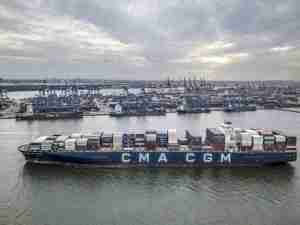With port congestion and infrastructure challenges remaining critical concerns in serving many Latin American markets, global carriers are responding with such measures as securing berthing windows and deploying geared vessels.
'Port congestion in Latin America continues to be a challenge, particularly in Brazil,' said Frank Larkin, senior vice president of Hamburg S'd North America, a unit of the German shipping giant. 'Our rotation includes additional 'buffer time,' and we have guaranteed berthing windows reserved at key ports.'
Laurent Flaguiere, deputy vice president of Caribbean and Latin America services for France-based CMA CGM, commented, 'If you look at the infrastructure in Latin America, especially East Coast South America, there is a problem with congestion. Globally, this is an item which calls for attention.'
Flaguire said CMA CGM is among carriers building flexibility into schedules to overcome possible delays in getting out of berths in Brazil and some other ports. He added, however, that this approach is, 'probably not a good way to solve the problem.'
Doron Goder, president and chief executive officer of Israel-based Zim Integrated Shipping Services, said, 'Port congestion in the East Coast of South America and lack of sufficient port infrastructure in terms of cranes leads us, as well as many others, to rely on geared tonnage.
'This is a 'must have' of the past [and has] improved a lot in recent years. We expect less and less dependency on such costly vessels to operate,' Goder continued. 'Secondary ports, however, will still require geared vessels for the foreseeable future, which Zim will need to tackle one way or the other.'
Danish industry leader Maersk Line faces similar challenges, according to Mary Ann Kotlarich, Maersk Inc.'s general manager for external communications.
'In general, port infrastructure needs immediate expansion in most countries to keep up with capacity and to continue the growth,' Kotlarich said. 'Rising costs are also a challenge in the industry in general.'
Hamburg S'd's Larkin, who is based in Morristown, NJ, explained that challenges in serving Latin America are far-reaching.
'Fuel costs remain high, and the cost of energy ripples throughout our operations in terms of higher intermodal costs for trucks and rail,' he said, citing cost control as a priority for Hamburg S'd. 'Intermodal congestion is a continuing problem at both ends of the trade lane and includes shortages of berth capacity and port labor, rail system bottlenecks including equipment shortages, congested highways and shortages of truck drivers and a strong need for better sharing of information industrywide to better anticipate and plan for future growth. Additional costs impacting us and our customers include environmental regulations and port and vessel security.'
At the same time, Larkin said, strengthening Latin American currencies, including the Brazilian real, against the dollar has led to a slowdown in Latin American exports Northbound, while increases in Southbound flows have not kept pace with these shifts.
On a positive note, Larkin said the configuration of his firm's East Coast Inter-American and US Gulf-East Coast South American services to use stand-alone rotations that deploy the carrier's own vessels helps afford schedule integrity and reliability. The use of vessels of identical size and design optimizes load planning and operational efficiency, he said.
Additional flexibility and expanded range will be gained through a proposed Hamburg S'd slot-swap agreement with CSAV, filed with the Federal Maritime Commission in February, Larkin said. Also, a recently added call at Paranagua helps to better serve the needs of shippers with resources in southern Brazil. An added call at Puerto Cabello responds to Venezuela's expanding trade needs, spurred by an economic strengthening bolstered by growth in the value of petroleum exports.
CMA CGM's Flaguiere, who is based at his company's headquarters in Marseilles, s








